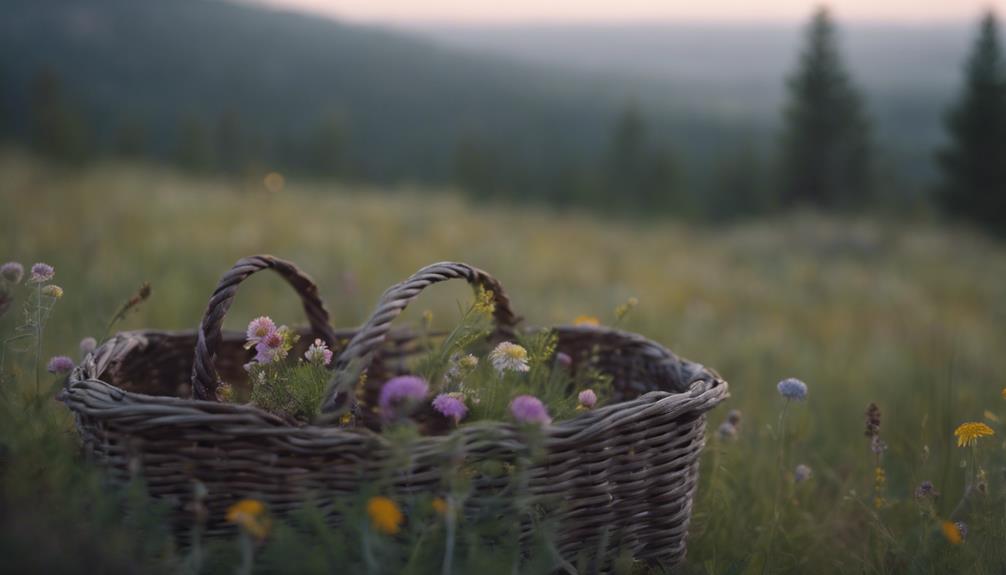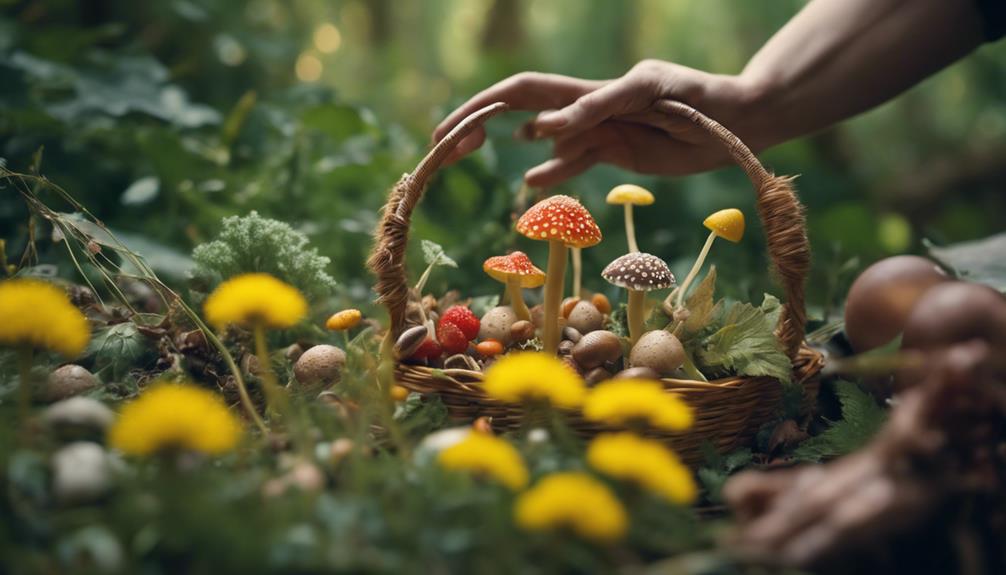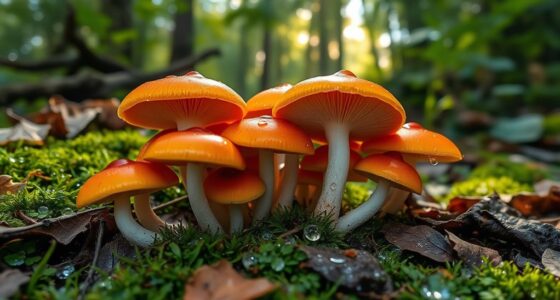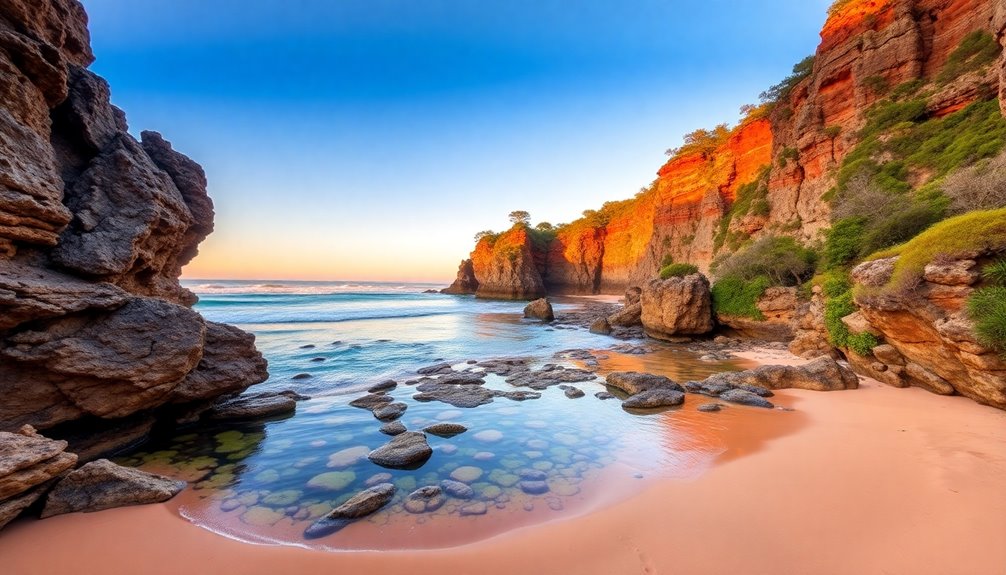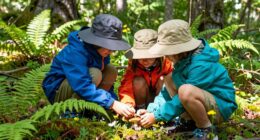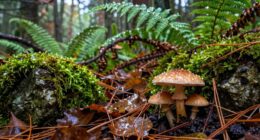Respecting park rules is crucial when foraging in Colorado State Parks. Unauthorized foraging can harm ecosystems, so it's important to follow regulations and permits to preserve the natural environment. Make sure to check with Colorado Parks and Wildlife or park officials for guidelines, as some parks offer guided foraging tours or workshops. Permit requirements vary, and understanding the rules will help you avoid fines or penalties. By adhering to the guidelines, you'll be able to forage sustainably and responsibly. Want to learn more about foraging in Colorado State Parks?
Key Takeaways
- Foraging in Colorado State Parks requires permits or specific authorization to avoid harming the ecosystem and preserve natural resources.
- Rules and regulations for foraging vary between parks, so it's essential to consult with park rangers or officials for permissions and restrictions.
- Some State Parks offer guided foraging tours or workshops, which promote responsible foraging and provide educational opportunities.
- Foraging activities are subject to specific guidelines, such as designated areas for educational activities, and "leave no trace" principles to minimize environmental impact.
- It's crucial to check with individual State Parks for specific guidelines and regulations before engaging in foraging activities to avoid fines or penalties.
Foraging in Colorado State Parks 101
Prior to venturing out to forage in a Colorado State Park, it's important to understand that permits or specific authorization are usually required to avoid harming the ecosystem and disrupting wildlife habitats.
You might be excited to explore the great outdoors, but it's vital to respect the rules and regulations in place to preserve the natural environment. Unauthorized foraging can have devastating consequences, damaging the delicate balance of the ecosystem and disrupting wildlife habitats.
Before you head out, check with Colorado Parks and Wildlife regulations or park officials for specific guidelines on foraging in State Parks. You might be surprised to find that some State Parks offer guided foraging tours or workshops for educational purposes.
Mushroom Hunting Regulations Vary

When you head out to hunt for mushrooms in Colorado State Parks, remember that regulations can shift drastically from one park to another, so it's important to check the specific rules before you start foraging.
You might assume that mushroom hunting is allowed everywhere, but that's not the case. Some parks permit mushroom hunting for personal use, while others have restrictions or bans in place.
To make sure you're not breaking any rules, consult with park rangers or officials for information on mushroom hunting permissions and restrictions within Colorado State Parks.
It's vital to respect park regulations and guidelines when foraging for mushrooms to help preserve the natural ecosystem. Be mindful of protected areas or sensitive habitats where foraging may not be allowed to ensure conservation efforts are maintained.
Park Regulations to Keep in Mind

Understanding these rules is vital to avoid fines or penalties while planning your foraging adventure in Colorado State Parks, as regulations are in place to protect the natural resources and ecosystem. As a responsible forager, you should be mindful that gathering mushrooms, berries, or other wild edibles is typically prohibited to preserve the ecosystem and protect wildlife.
| Park Regulation | Purpose | Consequence |
|---|---|---|
| Prohibit removal of plants, rocks, or natural resources | Protect ecosystem and wildlife | Fines or penalties |
| Designated areas for educational foraging activities | Promote responsible foraging | Varying rules and permits |
| Leave no trace, respect natural resources | Preserve park environment | Enhanced experience |
| Check with park officials for specific rules | Ensure responsible foraging | Avoid fines or penalties |
Some state parks may have designated areas or programs for educational foraging activities, but it's important to check with park officials for specific rules. As a mushroom hunter, understanding these regulations will help you enjoy the outdoors responsibly and avoid any penalties. Remember to follow park regulations, leave no trace, and respect the natural resources in Colorado State Parks.
Permitted Foraging Activities Explained

While understanding park regulations is vital, you're probably eager to know when and where you can forage in Colorado State Parks, and the good news is that some parks do allow mushroom hunting, but with varying degrees of permission and restriction.
You'll need to check with individual state parks for specific guidelines on foraging activities, as regulations may vary by location. Some parks might require permits or have restrictions on the types and amounts of mushrooms you can forage.
Remember to respect the natural environment and follow Leave No Trace principles while foraging in Colorado State Parks. Be aware of any seasonal closures or special rules regarding foraging activities in state parks.
It's important to do your research and plan ahead to ensure a safe and responsible foraging experience. By understanding the permitted foraging activities and following the rules, you can enjoy the thrill of mushroom hunting while preserving the natural beauty of Colorado's state parks.
Rules for Collecting Wild Mushrooms

Before you head out to collect wild mushrooms in Colorado State Parks, make sure you're aware of the rules and regulations that govern this activity. Collecting wild mushrooms in Colorado State Parks is generally prohibited without a permit or specific regulations. Be sure to check with Colorado Parks and Wildlife or the specific State Park for rules on mushroom foraging.
| State Park | Mushroom Foraging Rules | Guided Tours |
|---|---|---|
| Rocky Mountain State Park | Prohibited without permit | Offered seasonally |
| Golden Gate Canyon State Park | Allowed with permit | No guided tours |
| Eldorado Canyon State Park | Prohibited without permit | No guided tours |
| Lory State Park | Allowed with permit | Guided tours on weekends |
Responsible Foraging Practices Matter

To secure a sustainable future for Colorado's natural resources, you must prioritize responsible foraging practices when exploring the state's parks. This means obtaining permission before collecting any natural resources and following the rules and regulations of the specific State Park regarding foraging activities.
It's vital to prioritize sustainability and conservation of the natural environment, respecting the delicate balance of flora and fauna within Colorado State Parks. By adopting leave no trace principles, you can minimize your impact on the ecosystem.
Engaging in responsible foraging practices helps protect the natural environment and guarantees its preservation for future generations. Consider taking foraging classes to learn more about sustainable foraging practices and how to identify edible species.
Protecting Colorado's Ecosystems Today

By following regulations and guidelines, you play a vital role in protecting Colorado's ecosystems today, safeguarding the long-term health and diversity of its natural resources.
As you venture into Colorado's state parks, national forests, and wildlife areas, it's imperative to respect the delicate balance of these ecosystems. By doing so, you'll help preserve the unique biodiversity that makes Colorado's natural landscapes so remarkable.
Responsible foraging practices are pivotal in maintaining this balance, and it's up to you to make sure that your actions don't harm the very environments you're exploring. By adhering to the rules and guidelines set by Colorado Parks and Wildlife, you'll not only enjoy your foraging experience but also contribute to the long-term conservation of Colorado's ecosystems.
State Park Foraging Permit Requirements

When venturing into Colorado State Parks, you'll need to secure the necessary permits or authorizations from park officials before heading out to forage. This is important to guarantee sustainable foraging practices and protect the park's natural resources.
Remember, different state parks may have varying rules and regulations regarding foraging activities, so it's vital to check with each specific park for their policies.
Here are some key things to keep in mind:
- Permits may be required: Don't assume you can forage without permission. Check with park officials beforehand to avoid any issues.
- Private property restrictions: Be aware that some areas within the park may be private property, and foraging may not be allowed.
- Sustainable practices: Foraging permits help ensure that you're not over-harvesting or damaging the environment.
- Penalties for violations: Failing to comply with regulations can result in fines or other penalties, so make sure to follow the rules.
What to Expect When Foraging Alone

Frequently, solo foragers in Colorado State Parks must navigate unique challenges, from obtaining necessary permits to practicing sustainable harvesting methods. As you venture out alone, be prepared to follow specific guidelines and rules set by Colorado Parks and Wildlife. This guarantees that you're not only respecting the park's environment but also preserving its natural resources for future generations.
When searching for that prized mushroom, remember to practice leave no trace principles to minimize your environmental impact. It's crucial to be prepared with essential gear, knowledge of local flora, and safety precautions. Consider joining organized foraging events or workshops in Colorado State Parks to learn more about sustainable foraging practices.
Safety Reminders for Solo Foragers

As you venture out solo to forage in Colorado State Parks, make sure someone back home knows your itinerary and expected return time. This way, if something goes wrong, they'll know where to look for you.
When foraging for wild berries or other edibles, it's important to prioritize your safety.
Here are some essential reminders to keep in mind:
- Stay connected: Carry a fully charged cell phone and a map of the area in case of an emergency.
- Be prepared: Bring a first aid kit and know how to use the items in it.
- Know the rules: Familiarize yourself with park regulations regarding foraging to avoid any legal issues.
- Be aware of your surroundings: Keep an eye out for wildlife, changing weather conditions, and potential hazards like steep slopes or fast-moving water.
Frequently Asked Questions
Can You Forage in Local Parks?
You shouldn't assume you can forage in local parks, but it's possible with permission. You'll need to get authorized first, as unauthorized foraging can harm the ecosystem and lead to fines. Foraging in urban parks can have unintended consequences, such as disrupting local wildlife and depleting resources that other species rely on. If you’re interested in foraging in urban parks, it’s essential to contact park authorities or check local regulations to ensure that you’re following sustainable practices. Always remember to gather responsibly, taking only what you need and leaving enough for the environment to thrive.
Can You Forage in National Parks?
You shouldn't forage in national parks, as it's generally prohibited to preserve the environment and protect wildlife. You'll face penalties, like fines or citations, if you're caught collecting plants or resources in these protected areas.
Can You Find Morels in Colorado?
You're on the hunt for morels in Colorado! Yes, you can find them here, typically from April to September. Be sure to correctly identify and separate edible varieties from poisonous ones during your foraging adventure.
Conclusion
As you venture into Colorado's state parks, remember that foraging isn't a free-for-all. Regulations vary, and permits may be required. Be mindful of protected areas and ecosystems.
Don't be a modern-day Wild West outlaw, trampling the land for personal gain. Instead, be a modern-day steward, respecting the land and its rules. By doing so, you'll guarantee that Colorado's natural beauty remains intact for generations to come, just like the ancient trees that stand tall today.
Happy foraging!

